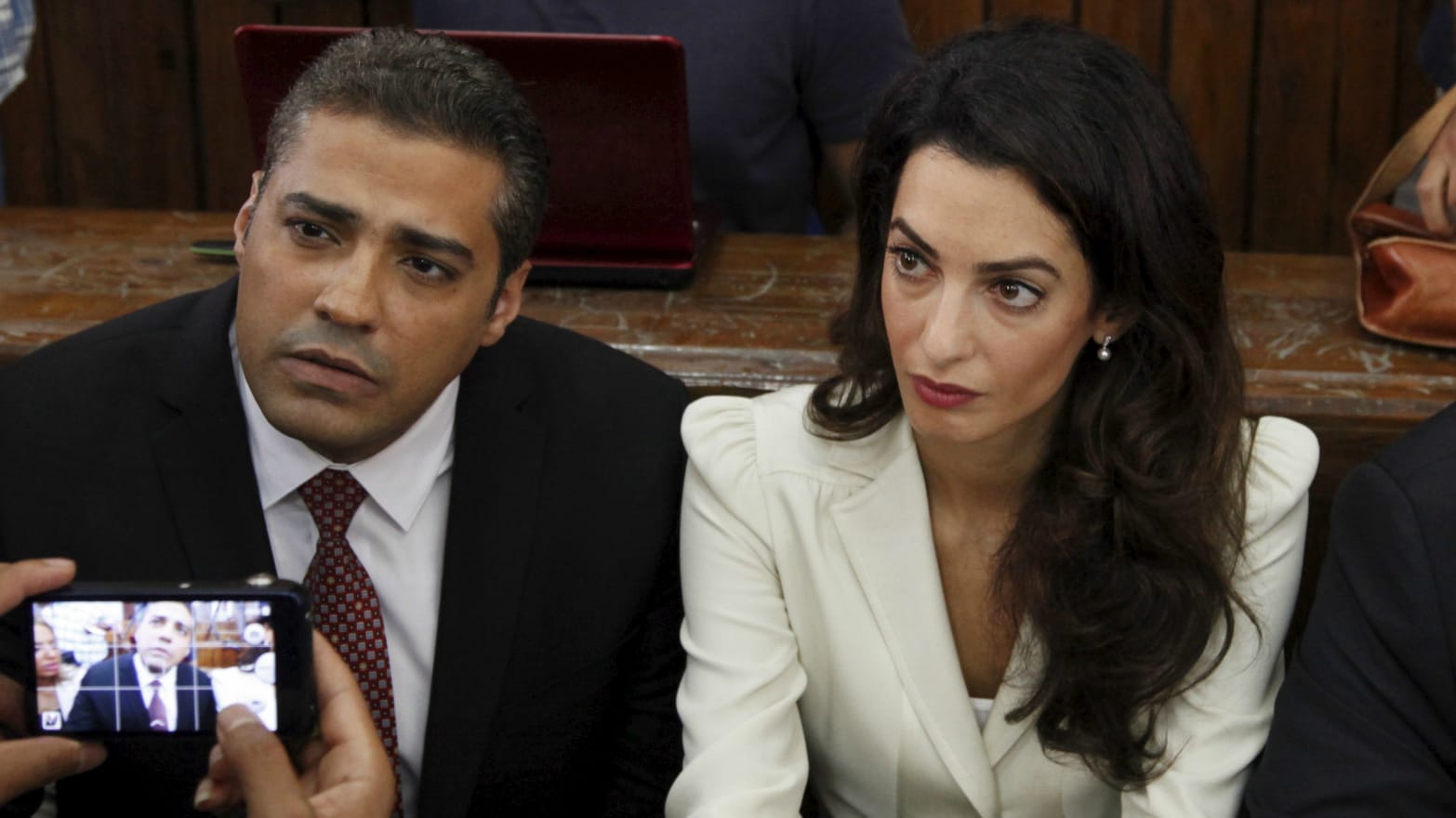An Egyptian court sentenced three al Jazeera journalists to three years in prison for spreading false news amid lacking evidence, in spite of two years of international pressure to throw out what was seen as a sham trial, and the presence of celebrity human-rights lawyer Amal Clooney.
Indeed, those factors may have contributed to the convictions of Canadian Mohamed al Fahmy, the channel’s onetime Egypt bureau chief, Egyptian Baher Mohammed, a producer, and Australian Peter Greste, the correspondent. In today’s volatile Egypt, the courts may have sought to assert their independence from both internal and outside pressure and to show it still has strong sway in Egyptian affairs.
Either way, the verdict shocked the Cairo courtroom as many were “cautiously optimistic.” Fahmy tweeted just before trial that the journalists would, at worst, receive a suspended sentence for the 14 months they served during the first trial as part of a June 2014 sentence of upwards of 10 years. But instead, the appeals judge, Hassan Farid, said the journalists were not properly registered, brought illegal equipment to the country and spread “false news.”
Fahmy’s wife, Marwa, cried uncontrollably, as did others. A sense of shock came over those who have been following the case for the past two years, for the fate of the journalists, what it said about Egypt’s judicial process in the post-revolutionary period, and the state of press freedoms. Fahmy and Mohammed were led away to jail without a chance to say goodbye to their families.
Mostefa Souag, Al-Jazeera English acting director-general, also criticized the verdict, saying it “defies logic and common sense.”
“The whole case has been heavily politicized and has not been conducted in a free and fair manner,” Souag said in a statement. “There is no evidence proving that our colleagues in any way fabricated news or aided and abetted terrorist organizations and at no point during the long drawn out retrial did any of the unfounded allegations stand up to scrutiny.”
Attending Saturday’s verdict, Clooney, a human-rights lawyer representing Fahmy, told reporters afterward that she and the Canadian embassy would seek deportation for Fahmy. Greste was released in February under a law passed by Egyptian President Abdel Fatah el Sissi allowing foreigners held in Egyptian prisons to be released, in what many saw as an attempt by the executive to find an out. Greste, however, remained a defendant in the case. Fahmy and Mohammed were released on bail shortly afterward, returning to the defendant’s cage Saturday for the verdict.
“The verdict today sends a very dangerous message in Egypt,” Clooney said afterward. “It sends a message that journalists can be locked up for simply doing their job, for telling the truth and reporting the news. And it sends a dangerous message that there are judges in Egypt who will allow their courts to become instruments of political repression and propaganda.”
The three journalists were arrested December 2013 at the Marriott Hotel in Cairo, where they worked as journalists for the station. The station is seen as supportive of the Muslim Brotherhood, the group through which ousted Egyptian President Mohammed Morsi rose to power. Days before their arrest, as anti-Brotherhood sentiment was at its peak, Egypt declared the group a terrorist organization and charged the men with running a terror cell out of the hotel, earning the case the name the “Marriott Cell.”
The charges and the case drew international outrage. Secretary of State John Kerry, who happened to be in Egypt during the original sentencing, called it “chilling and draconian.” And it contributed to Senator Patrick Leahy’s decision to block the transfer of U.S. military equipment to Egypt. Over time, as the U.S. ramped up its war on the Islamic State, its frustrations with Egypt over this case lessened. Kerry did not speak about the case publicly again, and Leahy eventually released the military equipment.
In the original verdict, the prosecutors presented evidence such as Greste’s vacation video found on his computer as evidence. Regardless, the men were convicted and sentenced to up to 10 years. The Egyptian Court of Cessation agreed to hear the case and Sissi indicated he wanted to see the case end, saying he would consider a pardon and that the case had harmed “Egypt’s reputation” in the eyes of the international community. Those developments raised hopes that the case would been seen in a new light.
The appeals case was just as lacking in evidence as the first. However, with the world press watching and Clooney sitting in the courtroom, the court instead delivered its guilty verdict, leading the journalists back in jail and sending a loud message throughout that the court’s grip on the state remains strong.

